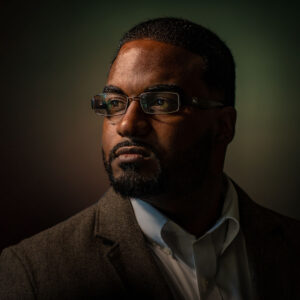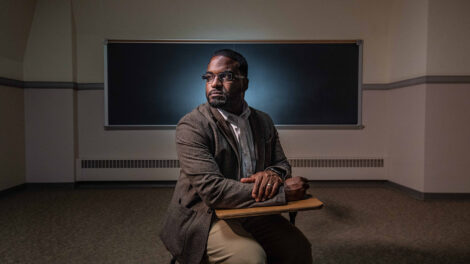By Shannon Sigafoos
“Of all the forms of inequality, injustice in health is the most shocking and inhumane.”
This quote from Martin Luther King Jr., made during a 1966 press conference in connection with the annual meeting of the Medical Committee for Human Rights, still rings true today. On Jan. 15, the Lafayette community—including faculty, staff, students, and guests—gathered virtually to hear Carlos Tavares, assistant professor of sociology, present about continued racial disparities in health care.

Prof. Carlos Tavares
The keynote speech was part of the ninth annual Reverend Dr. Martin Luther King Jr. Memorial Celebration and was sponsored by the Offices of Intercultural Development, Religious and Spiritual Life, and March Elementary School and Shawnee Elementary School, whose fifth graders were part of the festivities.
The Rev. Alex Hendrickson, college chaplain, Zachary Hunter ’22, treasurer of Association of Black Collegians (ABC), Robert Young ’14, director of intercultural development, and Daniel Gonzalez, principal of March Elementary School, provided opening remarks and reflection prior to introducing Tavares.
“I am honored to be the speaker for the MLK event this year to remember Dr. King’s legacy. Racial inequality in health, as Dr. King keenly pointed out, is in stark contrast in many health dimensions and warrants attention,” Tavares said just prior to the event. “I chose to focus on racial health disparities because I was interested in understanding how racism ‘gets under the skin’ and influences various dimensions of health. I was also very interested in what types of resources would mitigate the negative effects racism has on health.”
Discussing life expectancy at birth by race, Tavares explained that there is a difference of 3.8 years’ life expectancy between racial and ethnic minority groups and whites, and that racial health disparities can include heart disease, asthma, diabetes, health insurance coverage, and birth complications. He also compared COVID-19 rates, showing that Blacks, Hispanics, Asians, and Native Americans are four times more likely than white Americans to be hospitalized when they have the virus.
“What are some of the things we can do to address and solve these issues? Here is where we can draw inspiration from Dr. King. One of the things he talked about a lot was the idea of hope, and how hope wasn’t always easy but it was important that we maintain it,” shared Tavares. “His idea of hope was connected to action—that we work together as a society to bring about social change that would address injustices in health care.”
Tavares pointed out that because COVID-19 is much more serious for racial and ethnic minorities, by doing our small part in slowing the spread—including wearing masks, continued social distancing, and washing our hands—we have the ability to work together to do small things that will amount to something bigger.
Ending his presentation, Tavares shared one of King’s most memorable quotes: “If I cannot do great things, I can do small things in a great way.”
Melissa Niles ’21, president of NIA: Women of Purpose, delivered closing remarks, in which she encouraged the young students in attendance to forge their own path in terms of building support systems and building each other up throughout their academic journeys.
“We all know how important it is to have people have us and to help others. Some of you already have support systems in your life, and there are so many people around you who want to see you achieve your dreams and who are willing to help you,” said Niles. “There are going to be some bumps along the way, but having a support system makes the journey easier.”


